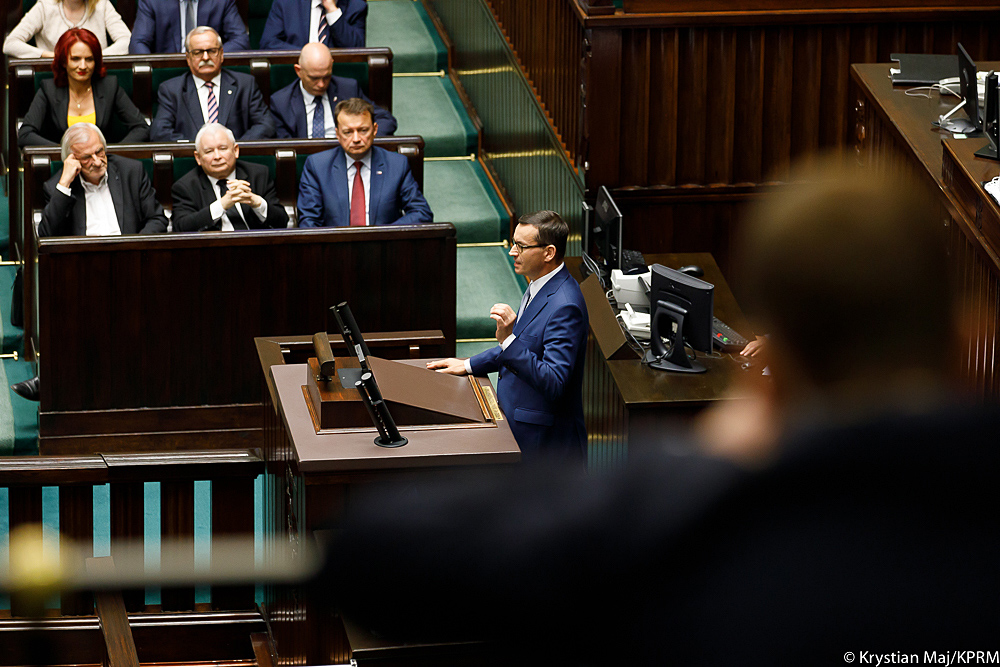By Aleks Szczerbiak
Despite ongoing bitter internal conflicts between its component parts, the Polish government’s imminent collapse still appears very unlikely. But the right-wing ruling party may conclude that the only way to break the political deadlock is to form a stop-gap minority government and call an early parliamentary election.
The governing camp’s structural weakness
Following the victory of ruling-party-backed incumbent Andrzej Duda in last summer’s presidential election, the right-wing Law and Justice (PiS) grouping, Poland’s governing party since 2015, appeared to be at the height of its powers, with an outright parliamentary majority and clear run until the next legislative elections, scheduled for autumn 2023.
However, since then it has suffered a string of political setbacks, not all of which can be put down to the debilitating effects of the ongoing coronavirus pandemic crisis. In particular, the governing camp has been embroiled in a series of increasingly bitter internal conflicts between various competing factions over policy, strategy and leadership raising questions about its cohesion, and even survival.
Public TV, which is widely seen as a government mouthpiece, has sparked a storm by criticising the head of a state fund overseeing Covid relief subsidies
The dispute has drawn in Poland’s most senior politicians and hints at cracks in the ruling coalition https://t.co/We2e3IzM6z
— Notes from Poland 🇵🇱 (@notesfrompoland) April 1, 2021
The governing camp’s key structural weakness is that its majority in the Sejm (currently 234 out of 460 seats), the more powerful lower house of the Polish parliament, actually comprises the United Right (ZP) electoral alliance, of which PiS is simply the largest component.
It also includes two smaller groupings: the right-wing conservative United Poland (SP), led by justice minister Zbigniew Ziobro; and more liberal-conservative Agreement (Porozumienie), led by deputy prime minister and economy minister Jarosław Gowin. These two parties increased their representation after the 2019 parliamentary election, securing around 20 deputies each, giving them much greater leverage within the governing camp.
This was exacerbated by the fact that the previously unquestioned authority of PiS leader and deputy prime minister Jarosław Kaczyński – who exercises a powerful influence in guiding and determining the government’s programmatic and strategic priorities, and has previously been the main guarantor of its political unity and cohesion – appears to be waning.
These internal tensions first came to a head last summer when Gowin resigned from, and threatened to pull his party out of, the government over a disagreement about the timing of the presidential election. In the event, the election was postponed until June and Gowin re-joined the government following the autumn ministerial reshuffle.
United Poland, on the other hand, has tried to stake out a series of hard-line conservative policy positions and criticise the government, especially the more technocratic PiS prime minister Mateusz Morawiecki, for being excessively compromising and ideologically timid.
This included calling upon Morawiecki to veto EU budget negotiations to block a European Commission proposal linking EU funding to so-called “rule of law” conditionality which, the party argued, applies ideological criteria to discriminate against Poland.
In the event, Morawiecki agreed to a compromise deal that United Poland strongly criticised although, unlike Gowin, Ziobro did not follow through and resign from the government.
Numerous escalating conflicts
Since the start of the year, there have been numerous clashes between PiS and its junior governing partners. In February, Janusz Kowalski, a United Poland nominee, was fired as deputy state assets minister, the department that oversees the Polish energy sector.
United Poland has criticised the government’s acceptance of the EU’s energy transformation policy, which envisages a significant reduction of coal consumption, as a threat to Poland’s energy sovereignty.
A few days later, and apparently in revenge for the sacking, United Poland deputies voted for an opposition motion obliging the PiS culture minister Piotr Gliński to present information to parliament on a controversial procedure for allocating pandemic crisis aid from the government’s culture support fund.
Similarly, Gowin pledged that Agreement deputies would vote against a PiS plan to introduce a media advertising levy to fund additional government expenditure on the health service and culture.
At the same time, a pro-PiS faction with Agreement, led by MEP Adam Bielan, tried to unseat Gowin as party leader, arguing that his term of office had expired. Gowin’s allies suspected that the challenge was initiated by Kaczyński, who has been wary of the Agreement leader since his apparent betrayal during last summer’s presidential election controversy and suspects him of negotiating with the opposition.
In the event, 13 out of the 18 Agreement deputies came out in support of Gowin, who expelled Bielan and called upon PiS to remove his supporters from their ministerial posts.
Then, in March, without informing the ruling party, United Poland deputy justice minister Marcin Warchoł announced his intention to contest a by-election for the post of mayor of the south-eastern city of Rzeszów, where he is a local parliamentary deputy, after the extremely popular incumbent Tadeusz Ferenc (originally aligned with the ex-communist left, but now an independent) unexpectedly resigned and endorsed his candidacy.
This election, scheduled for 9 May, will be keenly watched by the national media as a key indicator of party support. Rzeszów is the main town in the Podkarpacie region, a PiS stronghold, but there are currently no local mayors elected on the party’s ticket in any of Poland’s larger towns and cities.
A key political test for determining the coherence of the governing camp is likely to be the forthcoming parliamentary vote on the ratification of the EU coronavirus recovery fund, from which Poland is set to be major beneficiary. United Poland, which is increasingly using Euroscepticism as an identity-marker, has from the outset said that it will vote against the fund as a federalist Trojan horse.
Theoretically, PiS should be able to rely on opposition deputies, most of whom are very pro-EU, to secure parliamentary support. However, the liberal-centrist Civic Platform (PO) – Poland’s governing party between 2007 and 2015, and currently the main opposition grouping – is using the vote to try and force PiS to give a greater say over the distribution of funds to local authorities, many of which are opposition-controlled.
The smaller Left (Lewica) parliamentary caucus, whose votes would be sufficient to secure the fund’s passage, initially suggested that it would support the government unconditionally but now appears to be backtracking on this. Moreover, even then it would be extremely damaging for the government if it is forced to rely upon opposition votes to pass such an important measure.
Administering not governing?
Moreover, these divisions within governing camp are unlikely to be resolved easily because they are structural and very deeply rooted. Although PiS leaders insist that the three parties will contest the 2023 election as a coalition, the two smaller groupings are increasingly convinced that the ruling party will limit the number of places available to, or even completely exclude, them from the candidate lists.
Consequently, they feel obliged to develop independent political identities for themselves. United Poland draws upon a very similar core electorate to PiS, so to differentiate itself must attack the ruling party on its right flank.
Agreement is less of a direct electoral threat to the ruling party; indeed, there is little social base for a centrist liberal-conservative political formation in Poland. So it needs to look for potential electoral allies among the opposition groupings, which partly explains why Kaczyński is so suspicious of Gowin’s intentions.
Having said that, the government’s imminent collapse still appears very unlikely because there are powerful incentives for the three parties to stick together. For a start, remaining within the governing camp maintains the smaller parties’ access to the power, influence and patronage that flow from government participation.
For its part, PiS knows that it would almost certainly be unable to construct an alternative majority in the current parliament, nor govern effectively as a minority administration, never mind implement an ambitious programme of reforms, at a time of crisis. Kaczyński has, apparently, been trying to persuade the right-wing anti-establishment rock star Paweł Kukiz to join the governing camp, but his five-member parliamentary caucus would not even compensate for the loss of one of the smaller governing partners.
Moreover, a PiS-led administration is the only one that can guarantee a stable majority in the current parliament. Only three or four of Gowin’s allies would be likely to follow him if he were to actually leave the governing camp, so any alternative coalition would have to encompass an incredibly broad range of parties from the radical left to right, and risk being held responsible for triggering a political crisis when most Poles feel their leaders should be focusing on the coronavirus pandemic.
At the same time, an early election would also be a huge risk. Not only could it be seen as a self-indulgence, but polls currently suggest both that PiS would fail to secure another parliamentary majority and neither of its smaller allies would secure re-election standing independently.
In fact, the most dangerous moment for the governing camp, and most likely time for the two smaller parties to break away, is early-to-mid 2023 in the run-up to the next scheduled election. At that point, maintaining access to government positions will be less of an incentive, particularly if it appears that PiS will try and exclude them from the United Right candidate lists.
However, one also has to factor in human emotions, disappointed ambitions, revenge-seeking and simple miscalculation which could prevent the governing camp’s leaders from evaluating the various scenarios in a rational way. Moreover, Kaczyński has never been interested in simply being in office and administering, rather than actually governing and implementing a legislative programme, and knows how politically debilitating it can be.
For sure, the pandemic crisis has already put the government on the defensive, forcing it to react to ever-changing circumstances. Nonetheless, PiS also appears to have lost the ability to push through the more controversial elements of its policy agenda and governing programme. It is difficult to see how the party can move forward with its radical state reconstruction programme in areas such as reforming the judiciary, media landscape and local government, if it cannot guarantee the cohesion and unity of its parliamentary support base.
So Kaczyński may conclude that the current situation is unsustainable and the only way to break the deadlock is to form a stop-gap PiS minority government and then hold a snap (perhaps autumn) election, particularly if it appears that Poland is emerging from the coronavirus crisis by the late summer following a successful vaccine roll-out and lifting of restrictions.
Indeed, PiS is hoping that it can regain the political initiative through its so-called “New Deal” (Nowy Ład) recovery plan designed to boost economic growth and living standards through a wide range of policies including (partly EU-funded) large-scale investment projects in infrastructure and the public services (especially health care), together with tax reforms favouring the less well-off.
Voters will not forgive self-indulgence
Nonetheless, the pandemic crisis continues to be all-enveloping, with the “third wave” hitting Poland particularly hard and forcing PiS to postpone (for a second time) the formal launch of its “New Deal” initiative until after Easter.
Moreover, even in an optimistic scenario in which the government can start to move on from the crisis by late summer, the source of the governing camp’s continuing weakness and instability – a deeply-rooted lack of trust between its component parts, with the junior coalition partners continually and openly contesting key elements of the ruling party’s programme – will remain unresolved.
Indeed, one of the reasons why PiS has lost popular support is precisely because many Poles feel that the governing camp lacks unity of purpose and is increasingly self-absorbed. Voters may forgive PiS if it makes mistakes at a time of crisis, but not if the governing camp continues to come across as divided and inward-looking.
Main image credit: Krystian Maj / KPRM (under public domain)





















